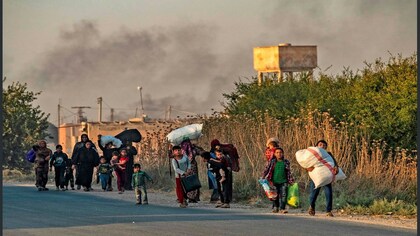Iran anxiety no match for Central Banker cash
15:21 - 9 February 2012

Iran’s nuclear ambitions, Syria’s bloody crackdown and Greece’s potential default are leaving markets unfazed as central bankers take unprecedented steps to prevent the global economy from crumbling.
The VIX, a measure of equity volatility known as the “fear index,” fell to 17.1 on Feb. 3, the lowest level since July, according to the Chicago Board Options Exchange. The Bank of America Merrill Lynch MOVE index, which measures swings in bond prices, closed at 72.3 on Feb. 6, about the least since July 2007. JPMorgan Chase & Co.’s index of implied volatility on currencies dropped to 10.2 on Jan. 23, its lowest since March.
While geo-political risks have risen, investors are taking their cue from policy makers from Washington to Frankfurt to Beijing who are driving down interest rates and flooding the world with cash to prop up their economies. The balance sheets of the world’s six biggest central banks have more than doubled since 2006 to $13.2 trillion, according to Chicago-based Bianco Research LLC.
“Investors are numb and sedated,” Jeffrey Sherman, a commodities money manager who helps oversee $25 billion for DoubleLine Capital LP in Los Angeles, said in a Feb. 7 telephone interview. “Money sloshing around the system leads to lower volatility.”
Investors have responded by driving equities to their best start in 18 years, pushing government bond yields to record lows and sending commodities prices soaring.
The Standard & Poor’s 500 Index rebounded 22.5 percent from its 2011 low on Oct. 3 amid efforts by European leaders to tighten budget controls, the Federal Reserve’s plans to keep rates low through at least late 2014, or more than a year later than planned, and corporate profits beating estimates.
Corporate bonds worldwide returned 2.38 percent in January, the best start to a year since bank of America Merrill Lynch’s Global Broad Market Corporate & High Yield Index was started in 1998. The firm’s index of sovereign bonds shows yields dropped to 2.79 percent this week from 4.28 percent in November. In commodities, the S&P GSCI Total Return Index has risen 15.7 percent from its low last year on Oct.
Markets rallied as the VIX fell from as high as 48 in August on a closing basis, while the MOVE index dropped from 117.8 that month. The JPMorgan index of currency volatility is down from 16.3 in September. That measure, which tracks three- month options on volatility on developed and emerging market currencies, is now below the average of 10.6 the past decade.
“Don’t overlook a global central bank community that’s intent on keeping liquidity flowing into the system,” Mitchell Stapley, the chief fixed-income officer at Fifth Third Asset Management who helps oversee $14.6 billion from Grand Rapids, Michigan, said in a Feb. 7 telephone interview. “If we learned anything from 2008, it’s that liquidity is the key variable. Liquidity flowing into the system cures a world of ills.”
The balance sheets of central banks in the U.S., Switzerland, U.K., European Union, Japan and China have swelled from a collective $4.99 trillion in May 2006 and $10.1 trillion in December 2008, two months after the collapse of Lehman Brothers Holdings Inc. spurred the worst financial crisis since the Great Depression, according to Bianco Research.
China’s central bank holds about $4.5 trillion of securities, the most of any such institution in the world, Bianco Research’s data show. The ECB has about 2.7 trillion euros ($3.6 trillion) while the Fed holds $2.9 trillion, up from $898 billion in 2008.
Fed Chairman Ben S. Bernanke said Jan. 25 that he’s considering another set of asset purchases, or quantitative easing. Economists in a Bloomberg News survey the same day estimated the central bank will buy mortgage bonds should the economy warrant more stimulus, with purchases of all types totaling $500 billion.
“Bottom line is we moved away from the disaster scenario and now it’s being endorsed or even underwritten by central bank activity in the U.S. and Europe,” Rob Robis, head of fixed- income macro strategies in Atlanta at ING Investment Management, which manages about $160 billion, said in a Feb. 7 telephone interview. “It makes sense that volatility should be coming off because you’ve taken that systemic risk out of the equation.”
In Europe, ECB President Mario Draghi has cut the benchmark rate to a record low of 1 percent, eased collateral rules and loaned banks an unprecedented 489 billion euros ($642 billion) for three years since he took the bank’s helm Nov. 1.
“These are stopgap measures,” Phoenix Kalen, a European credit strategist in London at Royal Bank of Scotland Group Plc, said Feb. 7 in a telephone interview of the ECB’s lending program. “We don’t think this is a lasting environment.”
The premium in oil prices should be two to three times higher than it is now based on the risk of military conflict in Iran and a potential lack of spare output capacity globally, according to Saxo Bank A/S. Oil for March delivery closed at $98.41 a barrel yesterday in electronic trading on the New York Mercantile Exchange, the highest settlement since Jan. 31.
Prices for European benchmark Brent crude include a $10-a- barrel premium that takes into account the possibility of an event that has the potential to disrupt crude shipments, Steen Jakobsen, Saxo Bank’s chief economist, said Feb. 1 in an interview at the Danish company’s office in Dubai.
“There is a lot of fanning the flames,” in Iran, said George Lopez, a former UN sanctions investigator now at the Kroc Institute for International Peace Studies at the University of Notre Dame in South Bend, Indiana. “The truth is that Iran is discernibly not any closer to the bomb than it was four or even six months ago. These threats rise and fall close to new sanctions, new IAEA reports and U.S. elections and I think markets are taking that into account.”
Almost a year after the uprising against Syrian President Bashar al-Assad, the UN said the regime has killed more than 5,400 people and the conflict is evolving into a civil war. Russia has blocked two attempts to take action against Assad, a top ally in the Middle East, leaving the Arab League and its Western allies looking for ways to end the bloodshed and bring about a political transition in the country.
At the same time, Israeli leaders have warned publicly that time is running out for a military strike that could stop Iran from developing nuclear weapons. Tensions rose further when Washington Post columnist David Ignatius wrote last week that U.S. Defense Secretary Leon Panetta believes there is a strong likelihood Israel will strike Iran in April, May or June.
“The risks to the Middle East are well known,” Kathy Jones, a fixed-income strategist in New York at Charles Schwab Corp., which has $1.68 trillion in client assets, said Feb. 7 in a telephone interview. “Some of these are long-term risks that have been around for a while. People are somewhat inured to them.”
In Europe, Greek Prime Minister Lucas Papademos and international creditors are haggling over terms to secure a second aid package from the so-called troika, comprising the European Commission, the ECB and the International Monetary Fund. Papademos is seeking to put the final touches to terms required for a 130 billion-euro ($172 billion) rescue package.
The package has been on the table since July as the government struggles to wind up financing to avert a collapse of the economy, risking a new round of contagion in the euro area. German Chancellor Angela Merkel said Feb. 6 that “time is running out” to reach an accord.
Yields on 10-year Italian government debt soared to a record 7.3 percent on Nov. 25 and have since declined to 5.6 percent. Italy’s bonds returned 5.4 percent last month, the most since August 1993, while those of Spain gained 2.5 percent, according to Bank of America Merrill Lynch index data. Bonds of European financial companies returned 3.5 percent in January, the best performance since July 2009.
The ECB loans have “taken a tail risk off the table,” Andrew Milligan, who helps oversee about $262 billion as the Edinburgh-based head of global strategy at Standard Life Investments Ltd., said in a Feb. 7 telephone interview, referring to a major disruptive event. “People were very concerned in the fourth quarter about a nasty bank deleveraging having a noticeable impact on the economy. That looks to be tempered for the time being.”
By John Detrixhe and Flavia Krause-Jackson
Source - Bloomberg
The VIX, a measure of equity volatility known as the “fear index,” fell to 17.1 on Feb. 3, the lowest level since July, according to the Chicago Board Options Exchange. The Bank of America Merrill Lynch MOVE index, which measures swings in bond prices, closed at 72.3 on Feb. 6, about the least since July 2007. JPMorgan Chase & Co.’s index of implied volatility on currencies dropped to 10.2 on Jan. 23, its lowest since March.
While geo-political risks have risen, investors are taking their cue from policy makers from Washington to Frankfurt to Beijing who are driving down interest rates and flooding the world with cash to prop up their economies. The balance sheets of the world’s six biggest central banks have more than doubled since 2006 to $13.2 trillion, according to Chicago-based Bianco Research LLC.
“Investors are numb and sedated,” Jeffrey Sherman, a commodities money manager who helps oversee $25 billion for DoubleLine Capital LP in Los Angeles, said in a Feb. 7 telephone interview. “Money sloshing around the system leads to lower volatility.”
Investors have responded by driving equities to their best start in 18 years, pushing government bond yields to record lows and sending commodities prices soaring.
The Standard & Poor’s 500 Index rebounded 22.5 percent from its 2011 low on Oct. 3 amid efforts by European leaders to tighten budget controls, the Federal Reserve’s plans to keep rates low through at least late 2014, or more than a year later than planned, and corporate profits beating estimates.
Corporate bonds worldwide returned 2.38 percent in January, the best start to a year since bank of America Merrill Lynch’s Global Broad Market Corporate & High Yield Index was started in 1998. The firm’s index of sovereign bonds shows yields dropped to 2.79 percent this week from 4.28 percent in November. In commodities, the S&P GSCI Total Return Index has risen 15.7 percent from its low last year on Oct.
Markets rallied as the VIX fell from as high as 48 in August on a closing basis, while the MOVE index dropped from 117.8 that month. The JPMorgan index of currency volatility is down from 16.3 in September. That measure, which tracks three- month options on volatility on developed and emerging market currencies, is now below the average of 10.6 the past decade.
“Don’t overlook a global central bank community that’s intent on keeping liquidity flowing into the system,” Mitchell Stapley, the chief fixed-income officer at Fifth Third Asset Management who helps oversee $14.6 billion from Grand Rapids, Michigan, said in a Feb. 7 telephone interview. “If we learned anything from 2008, it’s that liquidity is the key variable. Liquidity flowing into the system cures a world of ills.”
The balance sheets of central banks in the U.S., Switzerland, U.K., European Union, Japan and China have swelled from a collective $4.99 trillion in May 2006 and $10.1 trillion in December 2008, two months after the collapse of Lehman Brothers Holdings Inc. spurred the worst financial crisis since the Great Depression, according to Bianco Research.
China’s central bank holds about $4.5 trillion of securities, the most of any such institution in the world, Bianco Research’s data show. The ECB has about 2.7 trillion euros ($3.6 trillion) while the Fed holds $2.9 trillion, up from $898 billion in 2008.
Fed Chairman Ben S. Bernanke said Jan. 25 that he’s considering another set of asset purchases, or quantitative easing. Economists in a Bloomberg News survey the same day estimated the central bank will buy mortgage bonds should the economy warrant more stimulus, with purchases of all types totaling $500 billion.
“Bottom line is we moved away from the disaster scenario and now it’s being endorsed or even underwritten by central bank activity in the U.S. and Europe,” Rob Robis, head of fixed- income macro strategies in Atlanta at ING Investment Management, which manages about $160 billion, said in a Feb. 7 telephone interview. “It makes sense that volatility should be coming off because you’ve taken that systemic risk out of the equation.”
In Europe, ECB President Mario Draghi has cut the benchmark rate to a record low of 1 percent, eased collateral rules and loaned banks an unprecedented 489 billion euros ($642 billion) for three years since he took the bank’s helm Nov. 1.
“These are stopgap measures,” Phoenix Kalen, a European credit strategist in London at Royal Bank of Scotland Group Plc, said Feb. 7 in a telephone interview of the ECB’s lending program. “We don’t think this is a lasting environment.”
The premium in oil prices should be two to three times higher than it is now based on the risk of military conflict in Iran and a potential lack of spare output capacity globally, according to Saxo Bank A/S. Oil for March delivery closed at $98.41 a barrel yesterday in electronic trading on the New York Mercantile Exchange, the highest settlement since Jan. 31.
Prices for European benchmark Brent crude include a $10-a- barrel premium that takes into account the possibility of an event that has the potential to disrupt crude shipments, Steen Jakobsen, Saxo Bank’s chief economist, said Feb. 1 in an interview at the Danish company’s office in Dubai.
“There is a lot of fanning the flames,” in Iran, said George Lopez, a former UN sanctions investigator now at the Kroc Institute for International Peace Studies at the University of Notre Dame in South Bend, Indiana. “The truth is that Iran is discernibly not any closer to the bomb than it was four or even six months ago. These threats rise and fall close to new sanctions, new IAEA reports and U.S. elections and I think markets are taking that into account.”
Almost a year after the uprising against Syrian President Bashar al-Assad, the UN said the regime has killed more than 5,400 people and the conflict is evolving into a civil war. Russia has blocked two attempts to take action against Assad, a top ally in the Middle East, leaving the Arab League and its Western allies looking for ways to end the bloodshed and bring about a political transition in the country.
At the same time, Israeli leaders have warned publicly that time is running out for a military strike that could stop Iran from developing nuclear weapons. Tensions rose further when Washington Post columnist David Ignatius wrote last week that U.S. Defense Secretary Leon Panetta believes there is a strong likelihood Israel will strike Iran in April, May or June.
“The risks to the Middle East are well known,” Kathy Jones, a fixed-income strategist in New York at Charles Schwab Corp., which has $1.68 trillion in client assets, said Feb. 7 in a telephone interview. “Some of these are long-term risks that have been around for a while. People are somewhat inured to them.”
In Europe, Greek Prime Minister Lucas Papademos and international creditors are haggling over terms to secure a second aid package from the so-called troika, comprising the European Commission, the ECB and the International Monetary Fund. Papademos is seeking to put the final touches to terms required for a 130 billion-euro ($172 billion) rescue package.
The package has been on the table since July as the government struggles to wind up financing to avert a collapse of the economy, risking a new round of contagion in the euro area. German Chancellor Angela Merkel said Feb. 6 that “time is running out” to reach an accord.
Yields on 10-year Italian government debt soared to a record 7.3 percent on Nov. 25 and have since declined to 5.6 percent. Italy’s bonds returned 5.4 percent last month, the most since August 1993, while those of Spain gained 2.5 percent, according to Bank of America Merrill Lynch index data. Bonds of European financial companies returned 3.5 percent in January, the best performance since July 2009.
The ECB loans have “taken a tail risk off the table,” Andrew Milligan, who helps oversee about $262 billion as the Edinburgh-based head of global strategy at Standard Life Investments Ltd., said in a Feb. 7 telephone interview, referring to a major disruptive event. “People were very concerned in the fourth quarter about a nasty bank deleveraging having a noticeable impact on the economy. That looks to be tempered for the time being.”
By John Detrixhe and Flavia Krause-Jackson
Source - Bloomberg



